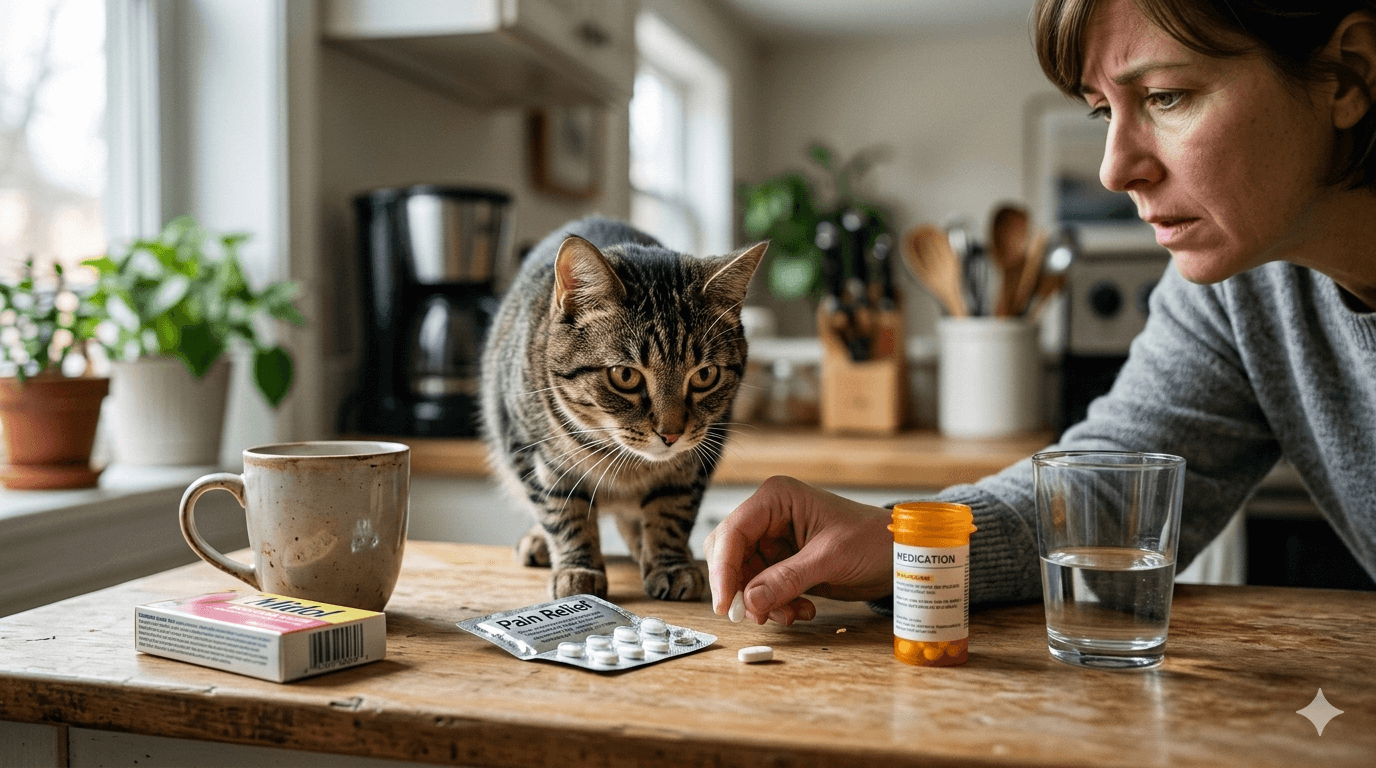Do Cats Know When You Are Sick? The Science and Stories Behind Feline Empathy
Cats are often seen as independent creatures, but anyone who has shared their home with a feline companion knows they can be surprisingly intuitive. Many cat owners have experienced moments when their pets seemed to sense something was wrong—whether it was a bad day, emotional distress, or even physical illness. But do cats really know when you’re sick? Can they detect subtle changes in your health, and if so, how do they respond?
In this article, we’ll explore the fascinating ways cats may pick up on human illnesses, the science behind their behavior, and heartwarming stories that highlight their uncanny ability to provide comfort when we need it most.
The Sixth Sense of Cats: How They Pick Up on Illness
Cats possess an extraordinary ability to notice changes in their environment, including shifts in their owner’s behavior or physical state. Their heightened senses allow them to detect signs of illness long before humans might realize something is amiss. Here are some ways cats may sense when you’re unwell:
Changes in Smell :
Cats have an acute sense of smell and can detect alterations in body odor caused by illness or medication.Shifts in Routine :
If you’re less active or spending more time resting, your cat will notice disruptions to their usual schedule.Tone of Voice :
Cats can pick up on subtle differences in your voice, such as weakness or fatigue, signaling that something is off.Body Language Cues :
Slouching, slow movements, or lack of energy can signal vulnerability to your observant feline.Behavioral Patterns :
Cats are attuned to their owner’s habits; any deviation, like skipping meals or staying in bed longer, catches their attention.
These keen observations make cats incredibly perceptive companions. While they may not understand the specifics of human sickness, they recognize when something feels different—and often respond with care and concern.
Comfort in Action: How Cats React When You’re Unwell
When a cat senses that their human is sick, they often display behaviors that show empathy, loyalty, and affection. These responses vary depending on the individual cat’s personality, but many exhibit similar patterns of support. Here are some common ways cats respond to their owner’s illness:
Increased Purring :
Purring has been linked to healing properties, and cats may purr near you to offer comfort.Staying Close By :
Your cat might choose to sit beside you, curl up next to you, or even rest on your lap for extended periods.Gentle Nudging :
Cats may nudge or lick you gently, seemingly checking in to see if you’re okay.Reduced Demands for Attention :
Some cats become quieter and less demanding, respecting your need for rest.Protective Behavior :
Certain cats adopt a protective stance, staying alert and watching over you closely.
These actions demonstrate just how deeply connected cats can be to their owners’ well-being. Whether through physical closeness or calming behaviors, they find meaningful ways to show they care.
Check this guide 👉Do Cats Think? Best 7 Expert Tips!
Check this guide 👉Do Cats See Color? Best 7 Expert Tips!
Check this guide 👉Do Cats Like Leashes? Best 7 Expert Tips!

Signs Cats Notice When You’re Sick | Ways Cats Show They Care |
|---|---|
Changes in body odor | Increased purring |
Altered daily routines | Staying close by |
Weakness in tone of voice | Gentle nudging or licking |
Slower movement or posture changes | Reduced demands for attention |
Differences in mood or energy levels | Protective or watchful behavior |
What Science Says About Cats and Human Health
Research into animal cognition and behavior provides intriguing insights into how cats interact with humans during times of illness. While much remains to be discovered, studies suggest that cats are far more attuned to us than we might realize. Here are some scientific findings about cats and their connection to human health:
Scent Detection Abilities :
Studies show that cats can identify specific scents associated with medical conditions, such as diabetes or cancer.Bonding Hormones :
Interactions between cats and their owners release oxytocin, often called the “love hormone,” strengthening their bond.Empathy Research :
Though debated, some researchers believe cats exhibit empathetic behaviors toward distressed humans.Routine Recognition :
Cats thrive on routine, and deviations from normal patterns trigger curiosity and concern.Healing Benefits of Purring :
The vibrations produced by purring have been linked to reduced stress and accelerated healing processes.
These findings underscore the depth of the human-feline relationship. While cats may not fully comprehend our illnesses, their instincts drive them to provide comfort in ways that benefit both parties.
Real-Life Tales: Cats That Knew Something Was Wrong
Countless anecdotes exist of cats detecting illness or distress in their owners, sometimes even saving lives through their intuition. These heartwarming stories illustrate just how special the bond between humans and cats can be. Here are a few examples:
Detecting Seizures Before They Happen :
Some cats have been known to warn epileptic owners moments before a seizure occurs.Curling Up Near Cancerous Areas :
Cats have reportedly focused their attention on parts of their owner’s body where tumors were later diagnosed.Providing Comfort During Depression :
Many people struggling with mental health issues report feeling supported by their cats’ constant presence.Alerting Others to Danger :
In rare cases, cats have alerted family members when their owner fell unconscious or needed help.Offering Solace After Surgery :
Cats often stay unusually close to owners recovering from surgeries or injuries, providing warmth and reassurance.
These stories remind us of the profound impact cats can have on our lives. Their ability to sense and respond to our needs makes them truly irreplaceable companions.
Feline Compassion: How Cats Show They Care When You’re Unwell
When you’re feeling unwell, your cat may go out of their way to provide comfort in subtle yet meaningful ways. These behaviors are often easy to overlook but speak volumes about the bond you share. Here are some signs that your cat is trying to comfort you:
Increased Cuddling :
Your cat may seek more physical closeness than usual, curling up beside or on top of you.Purring Near You :
Purring close to your face or chest can be a sign they’re attempting to soothe you.Bringing Toys or Gifts :
Some cats will bring their favorite toys or even “hunted” items as a gesture of care.Staring at You Intently :
Cats may watch you closely, seemingly checking if you need anything.Following You Around :
If your cat shadows your every move, it could mean they’re keeping a protective eye on you.
These small acts of kindness highlight how deeply cats care for their humans. Pay attention to these gestures—they’re your cat’s way of saying, “I’m here for you.”
The Protective Instinct: Why Cats Gravitate Toward the Sick or Sad
Cats have an innate ability to sense vulnerability in their owners, and this often triggers nurturing or protective behaviors. While their motivations aren’t fully understood, several factors likely play a role in why cats are drawn to those who are unwell.
Survival Instincts :
Historically, cats relied on vulnerable pack members to ensure group survival, a trait that may still influence their behavior today.Scent Changes :
Illness alters body chemistry, producing scents that cats can detect and respond to instinctively.Empathy-Like Responses :
Though debated, some experts believe cats exhibit behaviors akin to empathy when sensing distress.Routine Dependency :
Cats thrive on predictability, so disruptions caused by illness prompt them to investigate and adapt.Bonding Dynamics :
Strong emotional connections with their owners drive cats to offer support during tough times.
Understanding these underlying reasons helps explain why cats seem so attuned to our needs. Their actions, while simple, reflect a deep-seated desire to protect and comfort those they love.
Building Trust: Ways to Deepen Your Connection with Your Cat While Sick
Being sick offers a unique opportunity to strengthen the bond between you and your cat. By engaging in activities that foster trust and affection, you can make the most of this time together. Here are some tips to enhance your relationship during illness:
Talk to Your Cat :
Speaking softly to your cat reassures them and reinforces your connection.Offer Gentle Petting :
Light strokes, especially around the ears or chin, can help both you and your cat relax.Play Quiet Games :
Low-energy play, like using a feather wand, keeps your cat entertained without overexerting you.Provide Treats or Special Meals :
Sharing a treat or feeding your cat by hand strengthens mutual trust and affection.Create a Cozy Space Together :
Set up a comfortable area where you and your cat can rest side by side.
By focusing on quality interactions, you not only nurture your bond but also create lasting memories. Even in moments of weakness, your relationship with your cat can grow stronger than ever.
Frequently Asked Questions About Cats and Human Illness
Can cats tell if I’m sad or anxious?
Yes, cats can pick up on changes in your behavior and body language, often responding with comforting gestures.
Do cats get stressed when their owners are sick?
Some cats may feel anxious if their owner’s routine drastically changes, but others adapt quickly.
Can cats detect serious illnesses like cancer?
There are anecdotal reports of cats sensing cancer, though scientific evidence is still limited.
Why does my cat stay near me when I’m sick?
Cats are naturally drawn to vulnerable humans, likely out of instinctual care and attachment.
Should I worry if my cat acts differently when I’m ill?
Not necessarily—it’s normal for cats to adjust their behavior based on their owner’s condition.
Final Thoughts: Celebrating the Bond Between Humans and Cats
The question “do cats know when you are sick?” reveals the incredible depth of the bond we share with these intuitive creatures. Through their sharp senses, empathetic responses, and unwavering loyalty, cats prove time and again that they are more than just pets—they are cherished members of our families. Whether they’re curling up beside us during tough times or simply offering quiet companionship, their presence brings immense comfort and joy.
As we continue to learn more about the unique ways cats connect with us, one thing remains clear: having a cat by your side is a gift unlike any other. So the next time your furry friend seems to sense you’re under the weather, take a moment to appreciate their extraordinary ability to care—and return the love in kind.
Can I Give My Cat Midol? Best 7 Expert Tips! – Learn the risks, symptoms, and safe alternatives to keep your cat healthy and avoid toxic reactions.
Can I Give My Dog Midol? Best 7 Expert Tips! – Discover the risks, safe alternatives, and expert advice to keep your dog safe from accidental poisoning.
Maximum Weight for Cats on Planes: Best 7 Expert Tips! – Learn airline policies, tips to stay compliant, and ensure safe travels for your feline friend.
Max Weight for Dogs on Planes: Best 7 Expert Tips! – Discover airline weight limits, safe travel tips, and solutions for flying with your dog stress-free.





